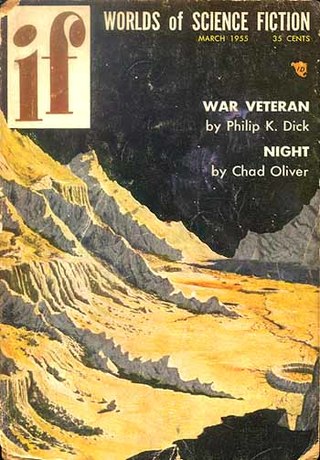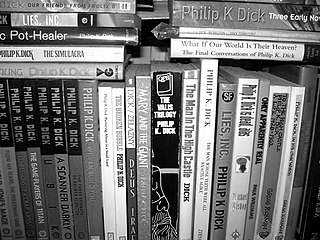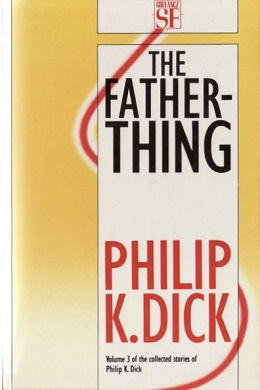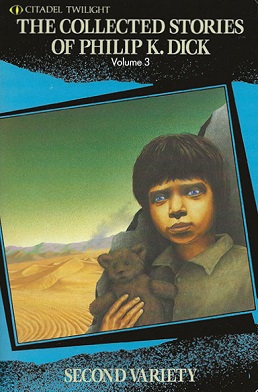
Philip Kindred Dick, often referred to by his initials PKD, was an American science fiction writer and novelist. He wrote 44 novels and about 121 short stories, most of which appeared in science fiction magazines during his lifetime. His fiction explored varied philosophical and social questions such as the nature of reality, perception, human nature, and identity, and commonly featured characters struggling against elements such as alternate realities, illusory environments, monopolistic corporations, drug abuse, authoritarian governments, and altered states of consciousness. He is considered one of the most important figures in 20th-century science fiction.

Fredric Brown was an American science fiction, fantasy, and mystery writer. He is known for his use of humor and for his mastery of the "short short" form—stories of one to three pages, often with ingenious plotting devices and surprise endings. Humor and a postmodern outlook carried over into his novels as well. One of his stories, "Arena", was adapted to a 1967 episode of the American television series Star Trek.
"Second Variety" is a science fiction novelette by American writer Philip K. Dick, first published in Space Science Fiction magazine, in May 1953. Set in a world where war between the Soviet Union and United Nations has reduced most of the world to a barren wasteland, the story concerns the discovery, by the few remaining soldiers left, that self-replicating robots originally built to assassinate Soviet agents have gained sentience and are now plotting against both sides. It is one of many stories by Dick examining the implications of nuclear war, particularly after it has destroyed much or all of the planet.
"The Father-Thing" is a 1954 science fiction short story by American writer Philip K. Dick. The story, told through third-person narration but focusing on the child, concerns the replacement of a boy's father with a replicated version. At first, only the child sees the difference and has to recruit other children to help him reveal the truth. The story is typical of Dick's short stories of the period.
"The Last of the Masters" is a science fiction novelette by American writer Philip K. Dick. The original manuscript of the story was received by the Scott Meredith Literary Agency on July 15, 1953, and the story was published by the Hanro Corporation in the final issue of Orbit Science Fiction in 1954. It has since been reprinted in several Philip K. Dick story collections, beginning with The Golden Man in 1980.
"Sales Pitch" is a science fiction short story by American writer Philip K. Dick, first published in Future Science Fiction magazine, June 1954. The premise is the omnipresent, intrusive and even aggressive advertising and marketing. At the end of the story, the protagonist is driven mad by a robot who can forcefully market himself, and refuses to take no for an answer. The subject was of concern to Dick, and features in his early works such as The Man Who Japed.
"Explorers We" is a science fiction short story by American writer Philip K. Dick. First published in Fantasy and Science Fiction magazine, January 1959. "Explorers We" was reprinted as a limited edition booklet to commemorate Dick's appearance at the Second International Festival of Science Fiction at Metz, France, September 1977. It was written in 1958, one of only two short stories that Dick wrote in the seven years between 1956 and 1962.

"The Defenders" is a 1953 science fiction novelette by American author Philip K. Dick, and the basis for Dick's 1964 novel The Penultimate Truth. It is one of several of his stories to be expanded into a novel. The story was first published in the January 1953 issue of Galaxy Science Fiction.

"War Veteran" is a science fiction short story by American writer Philip K. Dick. It was first published in If magazine in March 1955.
"Roog" is a science fiction short story by American writer Philip K. Dick. It was his first sold work, although not his first published story.

The bibliography of Philip K. Dick includes 44 novels, 121 short stories, and 14 short story collections published by American science fiction author Philip K. Dick during his lifetime.
"Impostor" is a science fiction short story by American writer Philip K. Dick. It was first published in Astounding SF magazine, 3 June 1953.
"Expendable" is a science fiction short story by American writer Philip K. Dick. It was first published in The Magazine of Fantasy and Science Fiction issue of July 1953. The plot centers on an unnamed human being caught in the middle of the ongoing, million year conflict between the degenerate descendants of the insects and humans.

The Collected Stories of Philip K. Dick is a collection of 118 science fiction stories by American writer Philip K. Dick. It was first published by Underwood-Miller in 1987 as a five volume set. See Philip K. Dick bibliography for information about the mass market reprints.

The Father-Thing is a collection of science fiction stories by American writer Philip K. Dick. It was first published by Gollancz in 1989 and reprints Volume III of The Collected Stories of Philip K. Dick. It had not previously been published as a stand-alone volume. Many of the stories had originally appeared in the magazines If, Science Fiction Adventures, Science Fiction Stories, Orbit, Fantasy and Science Fiction, Imagination, Future, Galaxy Science Fiction, Beyond Fantasy Fiction, Satellite, Science Fiction Quarterly and Imaginative Tales.

Second Variety is a collection of science fiction stories by American writer Philip K. Dick. It was first published by Citadel Twilight in 1991 and reprints Volume III of The Collected Stories of Philip K. Dick with the addition of the story "Second Variety". Many of the stories had originally appeared in the magazines If, Science Fiction Adventures, Science Fiction Stories, Orbit, Fantasy and Science Fiction, Imagination, Future, Galaxy Science Fiction, Beyond Fantasy Fiction, Satellite, Science Fiction Quarterly, Imaginative Tales and Space Science Fiction. There is huge overlap with the 1997 The Philip K. Dick Reader: stories 1–20 and 24 are identical.

The Philip K. Dick Reader is a collection of science fiction stories by American writer Philip K. Dick. It was first published by Citadel Twilight in 1997. Many of the stories had originally appeared in the magazines If, Science Fiction Adventures, Science Fiction Stories, Orbit, Fantasy and Science Fiction, Imagination, Future, Galaxy Science Fiction, Beyond Fantasy Fiction, Satellite, Imaginative Tales, Fantastic Universe and Space Science Fiction. It is identical in content and order to the edition of volume 3 of the Collected Stories of Philip K. Dick produced by the same publisher apart from the substitution of three stories in positions 21-23 of 24 and the omission of the end notes in the Collected Stories edition. At press time, stories 21 and 24 had already been made into successful movie adaptations and stories 22 and 23 had been optioned.
"The Preserving Machine" is a science fiction short story by American writer Philip K. Dick. It was first published in the June 1953 issue of Magazine of Fantasy and Science Fiction, and is included in a later collection of the same name, The Preserving Machine.
"The Great C" is a science fiction short story by American writer Philip K. Dick, first published in Cosmos Science Fiction and Fantasy Magazine in 1953. It has since been republished several times in collections such as Beyond Lies the Wub in 1988. Parts of the work, along with Planet for Transients, were later used in the full-length novel Deus Irae. The story is set in a post-apocalyptic world in which a young man is sent from his tribe every year to visit a godlike computer capable of mass destruction and try to stump it with three questions. The story was adapted into an animated virtual reality film in 2018 by Secret Location.
"Prize Ship" is a science fiction short story by American writer Philip K. Dick. It was first published in 1954 in Thrilling Wonder Stories and later in The Collected Stories of Philip K. Dick, Volume One: Beyond Lies The Wub and later trade editions of the collected stories.








